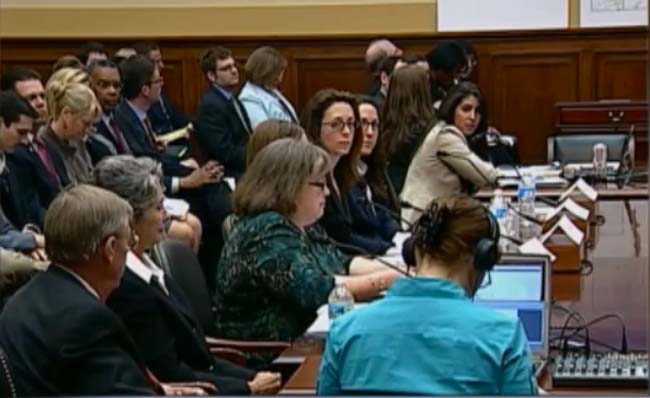
Yesterday, the House Foreign Affairs Committee held a hearing to review and discuss dozens of affidavits and listen to testimony from survivors of sexual assault. The committee also heard from the mother of a volunteer who was killed after reporting rapes to authorities. The stories these women told - whether they volunteered in the '70s or serve today - are shockingly consistent. They report that their training was inadequate and that the Peace Corps' response to their rape was callous, dismissive, or woefully insufficient. Many women have described their treatment by the Peace Corps headquarters in Washington as a second assault, almost eclipsing the first, because it was perpetrated by an institution they thought they knew and trusted. Now, as these stories are coming to light, the Peace Corps has an opportunity to set a new path to better prepare, protect, and care for its volunteers. The problems that must be addressed are large and systemic. Over 1,000 female Peace Corps volunteers have formally reported being sexually assaulted in the past decade. However, that number likely understates assaults; according to the Peace Corps' own annual volunteer surveys, 50 percent of sexual assault victims do not report their attacks. In an organization that relies on women for more than half of its volunteer ranks, this is an issue that simply can't be ignored.
Niger RPCV Karestan Koenen writes: For 20 years, I thought my experience with the Peace Corps was uniquely horrific. Instead, I have recently discovered through the testimonies of other returned and current Peace Corps volunteers that the problem is still ongoing, and not limited to any particular country or region.
Dealing with rape in the Peace Corps
OP-ED | Karestan Koenen
May 12, 2011|By Karestan Koenen
I WAS raped while serving as a Peace Corps volunteer in Niger in 1991, just a few days after Christmas. I was 22 and a virgin.
A few days after the rape, I was put on a plane, alone, to Washington, D.C., for medical treatment and follow-up interviews with Peace Corps officials. I was sent to a male gynecologist, who told me to stop being hysterical and to calm down during a rushed and inadequate medical examination. An individual in the Peace Corps' Inspector General's office - the very office charged with investigating Peace Corps misconduct and protecting volunteers - suggested I must have flirted with or somehow led my rapist on. My country director told me that the Peace Corps was siding with my attacker and would not help me prosecute him. I was devastated and felt abandoned and violated by the organization whose ideals had motivated me to become a volunteer.
For 20 years, I thought my experience with the Peace Corps was uniquely horrific. Instead, I have recently discovered through the testimonies of other returned and current Peace Corps volunteers that the problem is still ongoing, and not limited to any particular country or region.
Yesterday, the House Foreign Affairs Committee held a hearing to review and discuss dozens of affidavits and listen to testimony from survivors of sexual assault. The committee also heard from the mother of a volunteer who was killed after reporting rapes to authorities.
The stories these women told - whether they volunteered in the '70s or serve today - are shockingly consistent. They report that their training was inadequate and that the Peace Corps' response to their rape was callous, dismissive, or woefully insufficient. Many women have described their treatment by the Peace Corps headquarters in Washington as a second assault, almost eclipsing the first, because it was perpetrated by an institution they thought they knew and trusted.
Now, as these stories are coming to light, the Peace Corps has an opportunity to set a new path to better prepare, protect, and care for its volunteers. The problems that must be addressed are large and systemic. Over 1,000 female Peace Corps volunteers have formally reported being sexually assaulted in the past decade. However, that number likely understates assaults; according to the Peace Corps' own annual volunteer surveys, 50 percent of sexual assault victims do not report their attacks.
In an organization that relies on women for more than half of its volunteer ranks, this is an issue that simply can't be ignored.
Decades of research has shown that the social support a victim receives in the acute aftermath of a rape is a key factor in determining whether she will recover or suffer long-term adverse effects, such as developing post-traumatic stress disorder. The way in which the Peace Corps staff responds to rape survivors is vital to guiding both their physical and psychological recovery. Dramatic improvements are needed in in-country training and sexual assault response protocols. Sexual assault survivors must also be provided with trained advocates and appropriate resources to assist them with recovery and treatment when they return home.
The principal response from Peace Corps to date has been incremental written policy enhancements and a wholly inadequate commitment to create a single victims' advocate position to serve the needs of more than 7,000 volunteers in 77 countries throughout the world.
In 1992, John Hale, then acting inspector general for the Peace Corps, warned in a report to Congress of "a marked increase in violent acts against volunteers worldwide.'' Hale told the Dayton Daily News that he quit the Peace Corps after working on the report, in part because the agency ignored his warnings.
Today, the Peace Corps cannot be given 20 more years to fix this problem. To rely on the Peace Corps to solve this problem on its own, after decades of neglect, is to needlessly risk the well-being of its volunteers. Congress needs to pass legislation that will ensure Peace Corps makes the necessary institutional changes so that 20 years from now we are not hearing the same complaints from another generation of women.
Dr. Karestan Koenen is an associate professor of epidemiology at Columbia University Mailman School of Public Health and an adjunct associate professor at Harvard School of Public Health.














